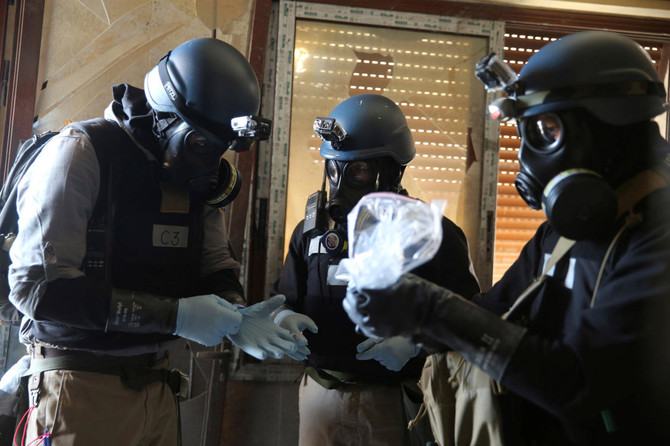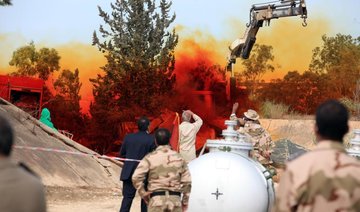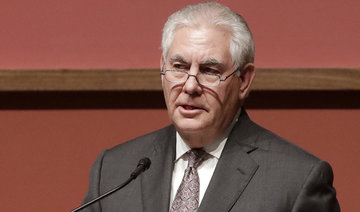WASHINGTON: The Trump administration on Thursday accused Syrian President Bashar Assad’s government of producing and using “new kinds of weapons” to deliver deadly chemicals despite committing to abolish its program in 2013, and said the world must find a way to stop it.
President Donald Trump has not ruled out additional military action to deter attacks or punish Assad, administration officials said, although they did not suggest any action was imminent. They emphasized that the United States was seeking a new way to hold chemical weapons-users accountable and wanted cooperation from Russia, Assad’s patron, in pressuring him to end the attacks.
Raising the alarm about the continued threat, US officials said it was “highly likely” that Assad kept a hidden stockpile of chemical weapons after 2013 that he failed to properly disclose. They said information gathered from recent alleged attacks also suggested that Assad retained a “continued production capacity” — also banned under the 2013 deal.
There were no indications that the Syria government, after seven years of civil war, had developed new, deadlier chemicals. Rather, the officials said they believed the weapons used to distribute the chemicals had evolved to become more sophisticated, potentially to evade international capability by making the origins of attacks harder to trace. The officials weren’t authorized to speak on the record and briefed reporters on condition of anonymity.
More recent attacks have involved both chlorine, which has nonchemical uses and is easier to acquire, and the more sophisticated chemical sarin, the officials said. They said that in recent years, Assad has also adjusted his tactics to reduce the chances that attacks will be attributed to his forces.
That has made evidence-collection more difficult, though the US believes it has a firm understanding of the extent of chemical use in Syria through a combination of intelligence, sample testing by third countries, and social media and other open-source information, the officials said.
Assad’s government has denied using chemical weapons, and its chief ally, Russia, has claimed that the reports are false attempts to pressure Syria’s government or provocations perpetrated by opposition groups. Syria and Russia have dismissed the conclusions of the Joint Investigative Mission, an expert body set up by the set up by the United Nations and Organization for the Prohibition of Chemical Weapons, that determined Assad’s government used chlorine gas in 2014 and 2015, and sarin in April 2017.
Use of such widely deplored weapons comes with great risk for Assad, raising questions about why he would take the chance. But the officials said the US believes Assad’s government sees chemical attacks as an effective way to terrorize rebels and sympathetic populations into fleeing, therefore altering the demographic balance in the Alawite heartland where Assad is trying to consolidate control.
Yet Syria’s government isn’t the only chemical weapons threat in the region, according to the officials. Daesh continue to use them, they said, although the militants’ arms are said to be more rudimentary.
Though Daesh no longer controls large parts of Syria or Iraq, the officials said the extremist group continues to use sulfur mustard, via artillery shells, and chlorine, delivered by improvised explosive devices. The officials noted that the underlying chemicals are easy to acquire or produce, and said the US does not believe Daesh has gotten ahold of military stockpiles in either Iraq or Syria.
Years of efforts by two US presidents have failed to end the harrowing reports on chemical weapons use in Syria.
Under President Barack Obama, the United States stopped short of striking Assad’s forces in response, but brokered a deal with Russia to rid Syria of its stockpiles. After another alleged attack in April 2017, President Donald Trump ordered a retaliatory missile strike, but 10 months later, the US and international observers say the weapons are still used.
Reports of chemical attacks have continued to stream in from Syria, including as recently as Thursday, when rescue workers in the rebel-held Damascus suburb of Douma reported what they described as a suspected chlorine gas attack that injured a number of civilians. The opposition-run Ghouta Media Center reported in a posting on its Facebook page that three people were killed and dozens suffered shortness of breath as a result of surface to surface missiles, some of them carrying chlorine gas.
The reports could not be independently verified and the Britain-based Syrian Observatory for Human Rights, which monitors the war in Syria via activists on the ground, was unable to confirm the reports either. The accounts followed a suspected attack in late January near Damascus that activists and rescue teams said affected nearly 20 civilians.
US says Syria may be making new types of chemical weapons
US says Syria may be making new types of chemical weapons

Houthi rebels say new air raids hit northern Yemen

A Houthi military statement said the raids were carried out in the Buhais area of Hajjah province’s Medi district, blaming “US-British aggression.”
There was no immediate comment from London or Washington.
The Houthis made the same claim about a raid they said hit a park in the capital Sanaa on Friday.
Hostilities have also flared between the rebels and Israel in recent days after a series of Houthi missile attacks prompted deadly Israeli air strikes in rebel-held areas on Thursday.
Six people were killed, including four at Sanaa airport, where World Health Organization chief Tedros Adhanom Ghebreyesus was waiting for a flight.
On Saturday, the Houthis claimed they had “successfully” targeted the Nevatim base south of Jerusalem with a ballistic missile.
The Israelis had earlier said a missile launched from Yemen was shot down.
The Houthis, part of the “axis of resistance” of Iran-allied groups, have been firing at Israel and ships in the Red Sea and Gulf of Aden in solidarity with Palestinians since the war in the Gaza Strip broke out last year.
Lebanon returns 70 officers and soldiers to Syria, security official says

- Many senior Syrian officials and people close to Bashar Assad have fled the country to Lebanon
Lebanon expelled around 70 Syrian officers and soldiers on Saturday, returning them to Syria after they crossed into the country illegally via informal routes, a Lebanese security official and a war monitor said.
Many senior Syrian officials and people close to the former ruling family of Bashar Assad fled the country to neighboring Lebanon after Assad’s regime was toppled on Dec 8.
The Syrian Observatory for Human Rights (SOHR), a London-based organization with sources in Syria, and the Lebanese security official said Syrian military personnel of various ranks had been sent back via Lebanon’s northern Arida crossing.
SOHR and the security official said the returnees were detained by Syria’s new ruling authorities after crossing the border.
The new administration has been undertaking a major security crackdown in recent days on what they say are “remnants” of the Assad regime. Several of the cities and towns concerned, including in Homs and Tartous provinces, are near the porous border with Lebanon.
The Lebanese security official said the Syrian officers and soldiers were found in a truck in the northern coastal city of Jbeil after an inspection by local officials.
Lebanese and Syrian government officials did not immediately respond to written requests for comment on the incident.
Reuters reported that they included Rifaat Assad, an uncle of Assad charged in Switzerland with war crimes over the bloody suppression of a revolt in 1982.
Earlier this month, Lebanese Interior Minister Bassam Mawlawi said top Assad adviser Bouthaina Shaaban had flown out of Beirut after entering Lebanon legally. In an interview with Al Arabiya, Mawlawi said other Syrian officials had entered Lebanon illegally and were being pursued.
Visiting Libyan official says discussed energy, migration with new Syria leader

- Syrians fleeing war since 2011 and seeking a better life have often traveled to Libya in search of work or passage
- Power in Libya is divided between the UN-recognized government based in the capital Tripoli and a rival administration in the east
DAMASCUS: A senior official from Libya’s UN-recognized government met Syria’s new leader Ahmed Al-Sharaa on Saturday and discussed issues including diplomatic relations, energy and migration.
“We expressed our full support for the Syrian authorities in the success of the important transitional phase,” Libyan Minister of State for Communication and Political Affairs Walid Ellafi told reporters after the meeting.
“We emphasized the importance of coordination and cooperation... particularly on security and military issues,” he said, while they also discussed cooperation “related to energy and trade” and “illegal immigration.”
Syrians fleeing war since 2011 and seeking a better life have often traveled to Libya in search of work or passage across the Mediterranean on flimsy boats toward Europe.
Ellafi said they also discussed “the importance of raising diplomatic representation between the two countries.”
“Today the charge d’affaires attended the meeting with me and we are seeking a permanent ambassador,” he added.
Power in Libya is divided between the UN-recognized government based in the capital Tripoli and a rival administration in the east, backed by military strongman Khalifa Haftar who also controls the south.
Representatives of Haftar’s rival administration in March 2020 opened a diplomatic mission in Damascus.
Before that, Libya had not had any representation in Damascus since 2012, following the fall and killing of longtime dictator Muammar Qaddafi in a NATO-backed uprising.
It was not immediately clear whether the charge d’affaires had been appointed since Sharaa’s Islamist group Hayat Tahrir Al-Sham (HTS) and allied factions toppled Assad on December 8 after a lightning offensive.
Also on Saturday, images published by Syrian state news agency SANA also showed Sharaa meeting Bahrain’s strategic security bureau chief Sheikh Ahmed bin Abdulaziz Al-Khalifa.
No details of the discussions were provided.
On December 14, top diplomats from eight Arab countries including Bahrain called for a peaceful transition in Syria with United Nations and Arab League support following Assad’s overthrow.
A day earlier, the official BNA news agency reported that Bahrain’s King Hamad had told Sharaa that his country was ready to “continue consultations and coordination with Syria.”
Damascus’s new authorities have received envoys from across the Middle East and beyond since taking control as countries look to establish contact with Sharaa’s administration.
First war-time aid convoy reaches besieged south Khartoum

CAIRO: Civilians in a besieged area south of Sudan’s war-torn capital received their first aid convoy this week since the war began 20 months ago, local volunteers said.
A total of 28 trucks arrived in the Jebel Awliya area, just south of Khartoum, the state’s emergency response room (ERR), part of a volunteer network coordinating frontline aid across Sudan, said Friday.
The convoy included 22 trucks carrying food from the UN’s World Food Programme (WFP), one truck from Doctors Without Borders and Care, and five trucks loaded with medicine from the UN children’s agency, UNICEF.
The local group and UNICEF said the supplies would help meet the “urgent health and nutrition needs of an estimated 200,000 children and families.”
Jebel Awliya is one of many areas across Sudan facing mass starvation after warring parties cut off access.
Since the war began in April 2023 between the Sudanese army and the paramilitary Rapid Support Forces, nothing has gone in or out without both parties’ approval.
ERR volunteers endured months of negotiations, constant suspicion and threats of violence to secure even limited access.
“Access to the area has been essentially cut off due to the conflict dynamics,” UNICEF’s Sudan representative Sheldon Yett said, adding it took three months of talks to get the convoy through.
“The trucks were detained on more than one occasion, and drivers were understandably reluctant given the risks involved,” he told AFP.
The lack of access has also prevented experts from making an official famine declaration in Khartoum.
Famine has already taken hold in five areas of Sudan, a UN-backed report said this week.
The WFP says parts of Khartoum and Al-Jazira state, just to the south, may already be experiencing famine conditions, but it is impossible to confirm without reliable data.
Across the country, more than 24.6 million people — around half the population — are facing high levels of acute food insecurity.
Both sides have been accused of using starvation as a weapon of war against civilians.
The war has killed tens of thousands and uprooted more than 12 million people, causing one of the world’s largest humanitarian crises.
Gaza hospital director detained after Israeli raid

- Dozens of the medical staff from Kamal Adwan Hospital detained for interrogation
- Palestinian militant group Hamas denied its fighters were present in the hospital
GAZA: An Israeli military raid targeting Hamas militants has forced a major hospital in northern Gaza out of service and led to the detention of its director, the WHO and health officials said Saturday.
The assault on Kamal Adwan Hospital has rendered the facility “useless,” further worsening Gaza’s severe health crisis, the Palestinian territory’s health officials said.
The World Health Organization said the operation had put the “last major health facility in north Gaza out of service.”
“Initial reports indicate that some key departments were severely burnt and destroyed during the raid,” it added in a statement on X.
The WHO said 60 health workers and 25 patients in critical condition, including some on ventilators, reportedly remained in the hospital.
Patients in moderate to severe condition were forced to evacuate to the destroyed, non-functioning Indonesian Hospital, the UN health agency said, adding it was “deeply concerned for their safety.”
Hamas-run Gaza’s health ministry reported that Israeli forces had detained Kamal Adwan’s director, Hossam Abu Safiyeh, along with several medical staff members.
AFP was unable to independently verify whether Abu Safiyeh had been detained, but multiple attempts to reach him were unsuccessful.
Gaza’s civil defense agency said Abu Safiyeh was held alongside its north Gaza chief, Ahmed Hassan Al-Kahlout.
The Israeli military did not comment on the detentions.
One of the Gazans evacuated from the hospital, who asked to be identified only as Mohammad for security reasons, told AFP some evacuees were interrogated about Hamas.
“As we began to exit, the army asked all young men to take off their clothes and walk outside the hospital,” said Mohammad, whose brother was a patient there.
“They (soldiers) took tens of young men, as well as physicians and patients, to an unknown place... The young men were interrogated, they were asked about resistance fighters, Hamas and weapons.”
Ammar Al-Barsh, a resident of Jabalia where the military has focused its assault in recent weeks, said the raid on Kamal Adwan and its environs had left dozens of homes in the area in ruins.
“The situation is catastrophic, there is no medical service, no ambulances and no civil defense in the north,” Barsh, 50, told AFP.
The army “continues to raid the Kamal Adwan Hospital and the surrounding houses, and we hear gunfire from Israeli drones and artillery shelling,” he added.
In the days leading up to the raid, Abu Safiyeh had repeatedly warned about the hospital’s precarious situation, accusing Israeli forces of targeting the facility.
On Monday, he issued a statement accusing Israel of targeting the hospital “with the intent to kill and forcibly displace the people inside.”
Since October 6, Israel has intensified its land and air offensive in northern Gaza, saying its goal is to prevent Hamas militants from regrouping.
The military said Friday that it was acting on intelligence regarding “terrorist infrastructure and operatives” in the hospital’s vicinity.
Before initiating the latest operation near the hospital, the military said its troops had “facilitated the secure evacuation of civilians, patients, and medical personnel.”
Hamas has denied claims its operatives were present at the hospital.
“The enemy’s lies about the hospital aim to justify the heinous crime committed by the occupation army today, involving the evacuation and burning of all hospital departments as part of a plan for extermination and forced displacement,” Hamas said in a statement.
Gaza’s health ministry had earlier quoted Abu Safiyeh reporting that the military had “set on fire all surgery departments of the hospital.”
“There are a large number of injuries among the medical team.”
Iran, which backs Hamas, “strongly condemned the brutal attack,” with a foreign ministry statement calling it “the latest example of war crimes, crimes against humanity, (and) gross violations of international law and norms.”
The Israeli military has regularly accused Hamas of using hospitals as command and control centers for attacks against its forces throughout the war.
Hamas has denied the accusations.
“This raid on Kamal Adwan Hospital comes after escalating restrictions on access for WHO and partners, and repeated attacks on or near the facility since early October,” the WHO said.
“The systematic dismantling of the health system in Gaza is a death sentence for tens of thousands of Palestinians in need of health care.”
Meanwhile, Hamas’s media center reported “massive Israeli air and artillery strikes in Beit Hanoun,” in northern Gaza .
The Israeli military says it has killed hundreds of militants since the stepped-up assault in northern Gaza began on October 6, while rescuers in the area say thousands of civilians have died in the sweeping offensive.
Gaza civil defense also reported that a separate Israeli strike in central Gaza killed at least nine Palestinians on Saturday.
The Gaza war was triggered by the Hamas-led October 7 attack on Israel last year, which resulted in 1,208 deaths, mostly civilians, according to an AFP tally of Israeli official figures.
Israel’s retaliatory military campaign has killed at least 45,484 people in Gaza, a majority of them civilians, according to figures from the Hamas-run territory’s health ministry that the UN considers reliable.


















